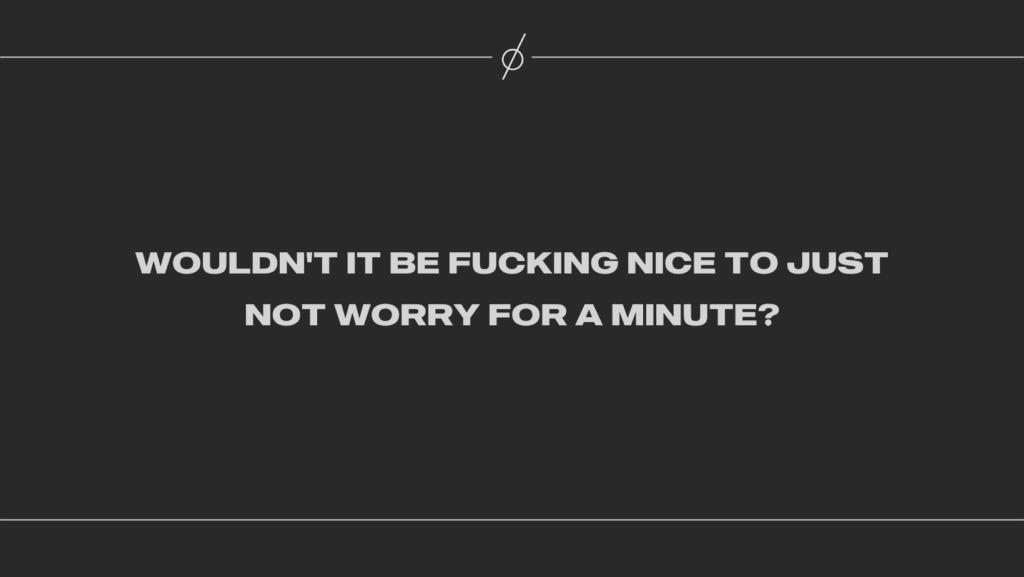The Real Reason You’re Constantly Over-Criticizing Your Partner (Hint: It’s Not What You Think)
November 18, 2024
Today’s conversation revolves around a bit of a hot topic…
Why we give everyone else in our lives the benefit of the doubt…but assume the absolute worst about our partners.
A client in one of my group containers was explaining that she feels she always gives other people the most generous assumption, but when it comes to her partner, she’s always over-criticizing him. She holds him to this extremely high standard she doesn’t apply to everyone else.
A lot of people struggle with over-criticizing their partner, no matter how happy they are in their relationships…even I’ve dealt with this in the past!
Let’s dive into why we get stuck in an over-criticizing pattern…and what we can do to adjust.

Safety in Shit-Talking
When I got back to this client, I explained that even though we feel like we have the most to lose when it comes to our partners—as in, you could lose the relationship you’ve invested one, five, ten, twenty years into—you’ve also created a lot of emotional safety with this person. So when it comes to over-criticizing them, there’s actually a good reason we do it…
Brace yourself—this is going to be hard to hear.
Why do we treat our partners like shit?
Because there’s a part of you that feels like you can get away with it.
There’s a part of you that believes you can indulge in over-criticizing and treating your partner like shit, and there will be no consequences. You may get into an argument, but deep down, you know they’re not going anywhere.
And even though that’s toxic as fuck, it does point to a level of emotional safety that you feel with this person.
That’s why we often treat our loved ones the worst. There are things that we would never dream of saying to a stranger that we have no problem saying to our partner, because there’s a level of closeness and safety that you guys have built where you feel like you can say it without getting reprimanded or abandoned.
If you said something nasty to an acquaintance or were always over-criticizing them, there’d be a high chance that that acquaintance would never want to see you again. But when you’re a couple years in, you get this attitude of, “Well, I can get away with over-criticizing you. You’re not going to do anything about it.”
It’s extremely childish and entitled, isn’t it? But it’s also super common.
Trigger Talk
That’s the first piece we need to look at when it comes to over-criticizing. The second piece is this: why are you so triggered by this person’s one behavior or pattern, but you aren’t as triggered (or at least, you can manage it better) when it’s a stranger behaving that way?
After all, you’re not sitting around dumping all your over-criticizing thoughts on a stranger. So what’s up?
The answer to this is actually pretty logical: our partners are typically the people that we are typically in the most physical proximity with. They’re always there with us. And relationships always act as a mirror.
Your partner is always reflecting things back to you. And if you have not accepted every single part of yourself, if they reflect things you find irritating about yourself, it’s going to really grate on you. And eventually, your over-criticizing behavior is going to come out.
Let’s say you typically fall into perfectionistic behavior. You have very, very high standards for yourself, to the point that it goes beyond high standards, because your deepest fear is feeling inadequate.
If your partner does something that hasn’t lived up to your idea of what the “standard” is, they are, to you, reflecting your own inadequacy.
So rather than you having to sit with your own feelings of inadequacy, your own feelings of not-enoughness, your own feelings of failure, whatever it is…you then project it outwards onto your partner. And there’s this core belief that if they could just stop engaging in this behavior, then he would be better, and your relationship would be better.
But you know what’s actually happening? You’re thinking that if he could do all of those things, then youy wouldn’t have to face off with that part of yourself.
Micromanagement
When you haven’t accepted all parts of yourself, you end up trying to manage the world so that you don’t ever get triggered.
You want to manage your partner. You want to manage your children. You want to manage your friends.
Everything is a fucking melodrama. Everything is, “I don’t like the way that you spoke to me,” or “I don’t like how you acted today,” and setting boundary after boundary after boundary.
And while we’re on the subject, quick PSA: Not everything needs to be a fucking boundary. Sometimes people are going to do things that are annoying, but it’s not actually affecting your sense of well-being. People are annoying sometimes, and that’s okay.
I think it’s unrealistic to think you’re never going to be annoyed by your partner. And that’s the thing…can that just be okay? Can we just be okay with some of the things they do being annoying?

Phases of the (Honey)moon
If you’ve just started noticing these feelings cropping up about your partner, don’t panic and hit the EJECT button on the relationship, all right? It could be as simple as you not being in the honeymoon phase anymore.
When you’re in the honeymoon phase, everything they do is the cutest thing ever. They could take a fucking shit and you’d be like, “Oh my god! I just love the way he sits on the toilet for thirty minutes. It’s so cute.”
However, if you have transitioned into the power struggle phase, where you’ve started focusing on your differences, him taking thirty minutes to take a shit on the toilet is the most infuriating thing ever.
But that doesn’t mean you two aren’t compatible. In fact…what feels like resentment to you might actually be jealousy.
The Contribution Problem
Let’s go back to the perfectionist example for this.
Let’s say you are a perfectionist, and let’s say your partner is chilling on the couch for three or four hours on a Sunday. Maybe he’s binging Netflix, maybe he’s watching the game…whatever it is, it’s the most infuriating thing to you.
All that’s going through your head is, “Don’t you fucking see how the house needs to be cleaned? Why aren’t you up helping me? Why aren’t you taking care of the kids?” etcetera, etcetera.
Now, I’m not denying that those things might be true. There’s duality to this; if the man is never contributing, in whatever way you guys have agreed upon—whether that’s through housework, childcare, financial contributions, or otherwise—that’s different.
But in this scenario, your partner is just taking time off.
Let’s say he worked all week, and so did you. Make it an even the playing field. You work a 9-5, he works a 9-5. You worked the same amount of hours, but he’s resting, and you’re freaking out about the house.
Let me ask you this…is there or is there not a part of you that is actually jealous of his ability to just clock off and do nothing?
Whoop, there it is.
Let me say it again: is there not a part of you that wishes that you could not feel responsible for the weight of the world, Little Miss Perfect? Is there not a part of you that wishes that you could be irresponsible or just not give a shit that the house needs to be cleaned? Wouldn’t it be fucking nice to just not worry for a minute?
Keep Your Eyes on Your Work
Let’s take this concept and apply it in a different scenario: let’s say you’re doing personal development work.
You’re listening to this podcast. You’re signing up for The Experience, my year-long group mentorship program. (Wink, wink! Come join us!)
You’re doing all the things, and then you’re looking at him, and you’re pover-criticizing every little thing he isn’t doing.
“What are you doing, bro? Are you going to get a therapist? Are you going to read the books? Are you going to get a coach? Are you going to listen to this podcast I sent you, ever?”
And again, this isn’t about reciprocity. If he’s really giving fucking nothing, that’s different. But I’m talking about something else.
Is there not a part of you that wishes you could just be okay with yourself the way that you are? Is there not a part of you that wishes that you didn’t have to do the work? Is there not a part of you that wishes you were secure?
When we look at it from a lens of, “Oh, there’s actually a longing here,” and you recognize those are the characteristics that you have repressed in yourself, it becomes easier to clock your over-criticizing pattern, own it, and clean it up.

It Takes Practice
When we’re trying to change our mindset around something, it takes practice. It’s not going to happen all at once.
It’s the same as learning to speak kindly to yourself. You can’t just say one nice thing to yourself and then expect your whole relationship with yourself to change—just like you can’t say one word of appreciation to your partner and expect six years of over-criticizing to go away.
But the antidote to over-criticizing is offering appreciation. So pay attention and ask yourself what you can start to appreciate—not just in your partner, but in yourself.
WORK WITH MICHELLE:
Join THE CONNECTED WOMAN, a shadow-work course for women who want to go from feeling anxious AF about their love lives to feeling confident, secure and having unfuckwithable self-worth: https://michellepanning.com/the-connected-woman
Join The EXPERIENCE, a year-long mentorship for the woman who wants to play in the frequency of big love, epic sex and mind-blowing relationships with men…and herself: https://michellepanning.com/the-experience
Are you a woman with all the knowledge, but none of the embodiment? Are you ready to remember who TF you are? Then you need to sign up for ALCHEMY – THE RETREAT: https://michellepanning.my.canva.site/alchemy
CONNECT WITH MICHELLE:
Instagram: http://www.instagram.com/michellepanning
Website: http://www.michellepanning.com

The Real Reason You’re Constantly Over-Criticizing Your Partner (Hint: It’s Not What You Think)
MINDSET & EMBODIMENT MENTOR
I'm Michelle
about the host
I get it, girl. I’ve been there too. For years, I was going through the same experiences with men over and over again that left me feeling confused, anxious and pissed off.
I silenced myself in dating and relationships because I was terrified of being judged, rejected and abandoned. It all changed when I went through a break-up and thought “enough is enough. I cannot continue to repeat the same relationships with different men! Something HAS to change!”